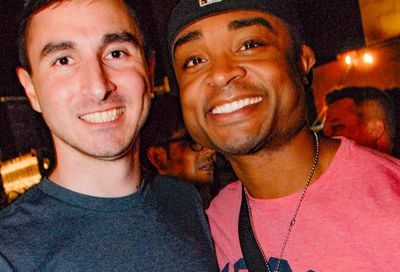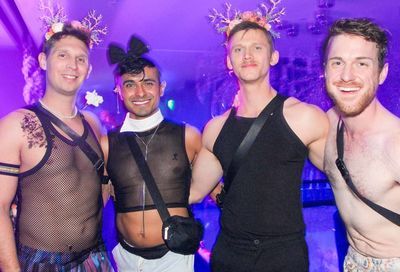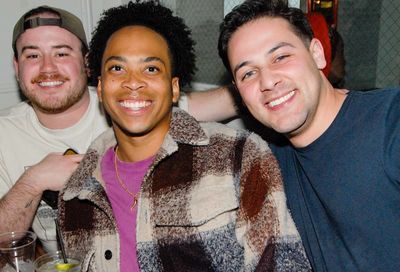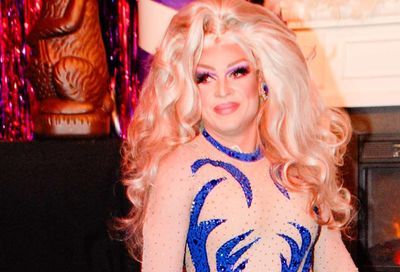Life with Pooh (and Piglet)
Alphabet Soup
Like many kids, I fell in love with the Winnie-the-Pooh literature when I was young and became enchanted with tales of Piglet (my favorite) and the others. The difference between most kids and me, though, is that I stumbled across the Pooh books when I was about twenty, in college. I never had them read to me when I was too little to read them for myself and never came across the books after I’d mastered Tags and Twinkles and the bastions of kiddie lit. Luckily, I also was never corrupted by Disney’s cinematic bastardizations of them.
Instead, one of the only openly gay guys on my college’s small and conservative campus mentioned in passing one day how great the Pooh books were, so I borrowed his copy of one of A.A. Milne’s two tomes of Winnie-the-Pooh stories. I figured I was in for a quick, trippy ride, but had no idea it’d be one of those life transformation moments.
I’ve always been captivated by children and the way they process information, the way they soak up the world. Maybe it’s because I was afraid of the world soaking me up when I was a kid. So I found my twenty-year-old self immediately enveloped by the tales of Christopher Robin and friends and their uncanny ability to speak to the child in me but entertain the adult in me. I was, perhaps not by coincidence, also coming out to most of my friends at that time and starting to think about coming out to my family. I found a solace in the stories of Winnie-the-Pooh that my oh-so-lesbian existence wasn’t finding in the oh-so-straight world I inhabited.
For a while, I kept track of an internet newsgroup for fans of Winnie-the-Pooh that focused primarily on the literature. Occasionally I’d post something, but mostly I lurked and studied the perspectives of the other newsgroup members. Most of them were adults, like me, although some had been pals of Pooh since they were young enough to believe that stuffed animals could come to life and walk and talk and eat hunny.
I found myself rising to the position of gay rights activist in the Winnie-the-Pooh context one afternoon when one of the newsgroup members posted something that was easily anti-gay, or gay-intolerant — something that ruffled my feathers. After all, this was a forum for people who loved the stories about this goodhearted bear and his innocent, quirky friends. Even Eeyore, under his gloomiest fog of depression, would never say anything anti-gay.
My feelings hurt and my pride shaken, I thought about my options. I could write back and be emotional, telling the homophobe to stay on topic or shut up. I could stay silent and let the issue pass — as it turned out, not many people wanted to head down that road anyway. Or I could use the strongest tool of them all: the common thread.
I turned to my Pooh books for an answer, and found it in the story where Kanga and Roo come to the Hundred Acre Wood. The other characters don’t know what to make of these new creatures; they’ve never seen anything like a kangaroo, and although it’s not mentioned, Kanga is the only female character of the bunch, which must have been alarming for the fellas. Christopher Robin, that voice of egalitarianism and reason, gets all nonchalant when Pooh asks him how Kanga and Roo arrived, so Pooh heads over to Piglet’s house and finds Rabbit there. Rabbit, who doesn’t like change, decides they need a plan of action with the ultimate goal of getting Kanga and Roo to leave their happy forest.
What riles Rabbit up the most, and what he uses to enlist Pooh and Piglet in his cause, is the fact that Kanga and Roo are different from the others. “We wake up one morning, ” he tells them, somewhat ominously, “and what do we find? We find a Strange Animal among us. An animal of whom we had never even heard before! An animal who carries her family about with her in her pocket! Suppose I carried my family about with me in my pocket, how many pockets should I want? ”
(Rabbit notoriously has a huge extended “family ” that includes all manner of creatures, including a beetle called Small — you’d think diversity wouldn’t bother him so much. He announces that he would need seventeen pockets to carry his family around, “and one more for a handkerchief — that’s eighteen. Eighteen pockets in one suit! I haven’t time. “)
The plan to chase Kanga and Roo away backfires, of course, as do all nefarious plots in the world of Pooh. What happens to Rabbit and his co-conspirators is that they get to know Kanga and Roo a bit in the process of grappling with their knee-jerk xenophobia. Like most people in our own society who get to know a gay person, Rabbit and Pooh and Piglet find themselves befriending Kanga and Roo. In fact, Pooh is so impressed with Kanga’s jumping abilities that he decides he wants to be a Kanga, and Rabbit (who has kidnapped Roo) finds himself growing fond of the young deviant.
It’s a lot like life, really — we fear what is foreign and strange to us, and then we get to know it better and realize how absolutely fun it can be to have new experiences and make new friends. Sadly, I don’t remember if I struck a chord with the intended audience with my parallel between the homophobic post on the newsgroup and the lesson learned when Kanga and Roo came to the forest. But I remember that others responded positively; I didn’t get any negative feedback, and that was the last we on the newsgroup heard of any homophobia.
The post I never wrote, though, was the one about the homoerotic undertones of the Winnie-the-Pooh literature, like when Piglet gets all excited at the sight of Christopher Robin’s suspenders, also known as “braces ” by our friends across the pond:
“But Piglet wasn’t listening, ” the narrator tells us, “he was so agog at the thought of seeing Christopher Robin’s blue braces again. He had only seen them once before, when he was much younger, and, being a little over-excited by them, had had to go to bed half an hour earlier than usual; and he had always wondered since if they were really as blue and as bracing as he had thought of them. ”
Turns out those Pooh stories have a little something for everyone.
Kristina Campbell is spending the blustery days of December bundled up in her Takoma Park house with a good book, or two. Her column appears biweekly, and she can be reached at kcampbell@metroweekly.net.
Support Metro Weekly’s Journalism
These are challenging times for news organizations. And yet it’s crucial we stay active and provide vital resources and information to both our local readers and the world. So won’t you please take a moment and consider supporting Metro Weekly with a membership? For as little as $5 a month, you can help ensure Metro Weekly magazine and MetroWeekly.com remain free, viable resources as we provide the best, most diverse, culturally-resonant LGBTQ coverage in both the D.C. region and around the world. Memberships come with exclusive perks and discounts, your own personal digital delivery of each week’s magazine (and an archive), access to our Member's Lounge when it launches this fall, and exclusive members-only items like Metro Weekly Membership Mugs and Tote Bags! Check out all our membership levels here and please join us today!





















